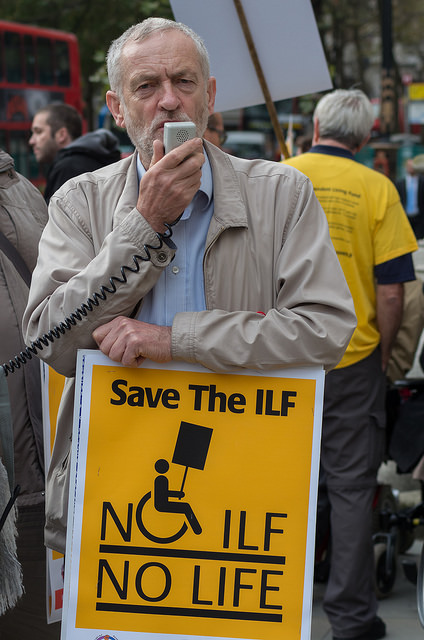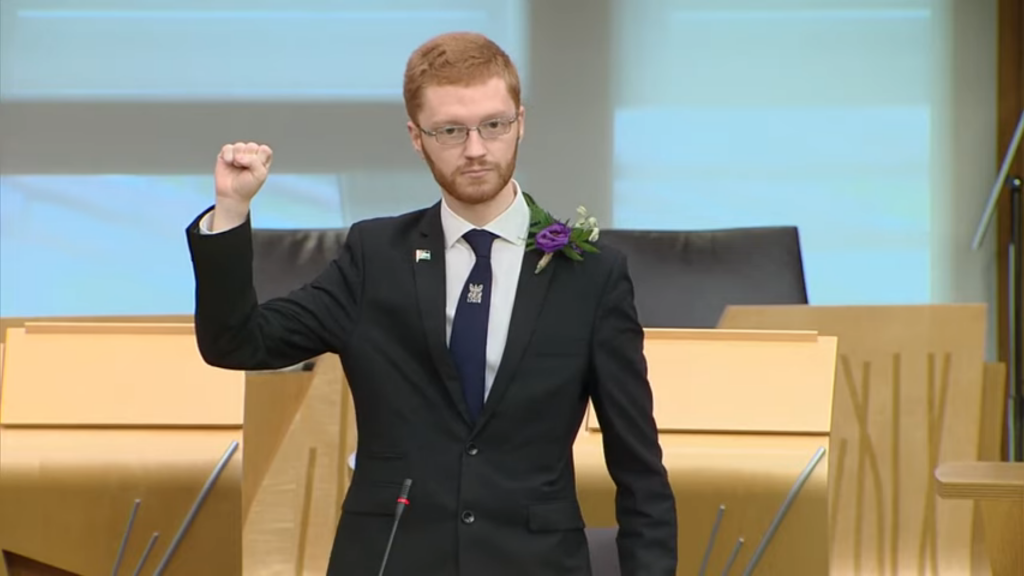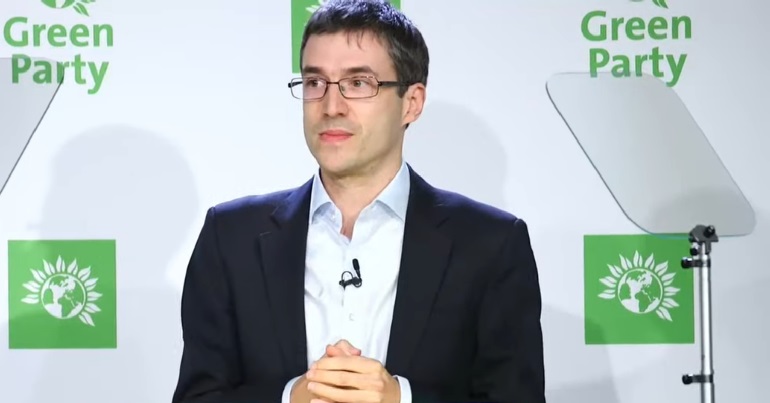What should anarchists do about Jeremy Corbyn?

It used to be easy. When I was first thinking about supporting Jeremy Corbyn’s candidacy for the Labour leadership, it felt like a stunt, a prank: at that point, Corbyn was merely a joke candidate, and so lending him support was about nothing more than getting certain views heard on national media. Now that those views have been heard on national media, and now that it turns out that quite a lot of the electorate actually likes them, particularly in the grassroots of the Labour Party, I feel like I have to take responsibility for that decision. The value of getting Corbyn heard has been proved, but do I actually want him in power?
Here’s the problem: at the core of my politics is the belief that the most practical, effective political work is self-organisation at a grassroots level: that self-organised campaigns of direct action and mutual support change people’s lives more than anything that happens in parliament, and are responsible for majority of the most liberatory gains made in past centuries. That it is parliamentary wrangling which is impractical; that the parliamentary political system is an oppressive distraction by its very nature.
Jeremy Corbyn offers a genuinely appealing policy platform to me. He combines old left economic positions (public ownership of key utilities, progressive taxation, high wages) with anti-militarist foreign policy and a new left approach to ecology and communitarian democracy. Were it conceivable that he could be in a position to make these things happen, I would be fully behind his movement – but for him to reach that position is going to be an astonishing struggle. It’s not just a question of getting him elected leader: it’s also about wrangling a Parliamentary Labour Party that largely loathes him and is likely to spawn a centre-right split, getting an electoral message past a monopolised media that is currently shouting UNELECTABLE PAEDO-DEFENDING HAMAS-SUPPORTING DIVORCED STALINIST as loud as possible, and then when elected negotiating the thousand awful compromises which constitute the bankrupt liberatory capacity of representative capitalist democracy in the first place (see “Pasokification”).
This means that taking responsibility for supporting Corbyn involves rallying extensive troops behind a painfully difficult electoral project. The largely pro-Corbyn wave of Labour recruitment could deliver half a million quid to a Party that’s currently thoroughly implicated in the direct deprivation, disenfranchisement and outright oppression of the most marginalised in our society: the thought of where else this money could have gone (material refugee support, campaigns against police brutality, social centres providing radical advice to benefit claimants…) turns my stomach. The thought of where radical energies could be better spent than getting Labour re-elected is horrifying.
But on the other hand, building political movements is not a zero-sum game, which is to say that adding energy to the pro-Corbyn movement doesn’t have to involve subtracting energy elsewhere: political energies can multiply, and being involved in one place might make you more involved somewhere else. Perhaps the pessimism of the mind and optimism of the will that’s involved in supporting Corbyn could translate into a lot more enthusiasm for supporting refugees, opening social centres and ending the police.
A number of commentators in Scotland have already drawn the comparison between the mounting media monstering of Corbyn and the independence referendum’s Project Fear: in the face of the possibility of change, the establishment closes ranks and subjects the population to a relentless assault of negative messaging. (Part of the hope is that, as with indyref, the result might be a pyrrhic victory.) Even the Telegraph has stopped talking about supporting Corbyn as a joke candidate and has returned to shouting PAEDO and complaining about how noisy the neighbours were in Haringey in the Eighties (actual column, but don’t Google it, it’s awful). There are broader comparisons we can make and lessons we can learn.
As with Corbyn, indyref offered possibilities of radical change in return for making compromises with electoral democracy. The SNP offered enough left-populist policies (the closure of Dungavel, opposition to Trident, opening of borders) to attract even the hard anarchist left to voting Yes: most of my anti-state friends joined the campaign, albeit reluctantly. And Corbyn offers a policy platform a long, long way to the left of anything offered in Scotland’s Future.
However, the post-indyref results have been mixed. My sense – which is not backed up by thorough empirical research, and which some have disagreed with – is that a number of radical social movements have seen their energies boosted as a result of the networks formed during the Yes campaign. Local struggles against austerity have been more prominent and are gaining more coverage; there’s still an optimistic energy around, albeit qualified. But we’ve also seen a huge boost to reactionary forms of nationalism, and the vast strengthening of the SNP, accompanied by only a very slight leftward shift: they still offer economic policies broadly indistinguishable from Labour’s, despite the anti-austerity talk. The Overton Window has shifted left in Scotland, and radical movements may have been strengthened, but this success of the Yes movement has come at the cost of the greater strengthening of reactionary nationalist and capitalist forces. When we think about what’s to be gained by supporting Corbyn, we also have to think about what – beyond guilty ideological impurity – it will materially cost us in terms of bolstering the forces and movements that would oppose us. Is the strength of the SNP, who have a stated national-capitalist agenda and are overseeing an increasingly draconian police force, going to overcome all the liberatory potential of the newly networked movements? Would a Corbyn Labour network newly radicalised Constituency Labour Parties in a network that could support radical struggle, or would a newly Labour Party demand and enforce a suppression of dissent that would hold back any liberatory potential?
Moreover, indyref offered a much greater space of possibility that this leadership election. The constitutional break of Scottish independence would be a spasm of history, a moment where political structures could reform, a fraught and exciting period in which strong and networked radical movements could potentially win greater change than the meagre offering in Scotland’s Future. Even before such imaginings, the length and breadth of the campaign meant there was real scope for strengthening community movements, learning about and discussing policy points, and using the indyref platform to lend support to immediate grassroots struggles. None of this is offered by the brief mediocrity of the Labour leadership race. In particular, Corbyn has not yet offered any sweeping constitional change, and if he did he offers little ability to enforce it: his election as Labour leader, and even the fantasy of his election as Prime Minister, would leave precisely the same oppressive Parliamentary structures (first-past-the-post voting, an unelected second house, an unrepresentative two-party system, sickeningly elitist Westminster culture and a bloody monarch) entirely intact. It seems that Corbyn as leader offers precious little future possibility.
But on the other hand, again, when making these decisions, I think we need to pay close attention to the movements of the most marginalised. I was personally impressed by the endorsement of Jeremy Corbyn by Disabled People Against the Cuts: DPAC is the very embodiment of my politics, a radical direct action and mutual support movement of the most marginalised. That they, as an organisation, see potential material gain in the election of Corbyn has me thinking hard. Similarly, there remains the issue of understanding that the Labour Party is the primary electoral vehicle of the Trade Union movement and thus an element of working class self-organisation: that movement as well has largely got behind Corbyn. Does organising with the unions mean taking the Labour Party seriously? It is too easy to get lost in theoretical positioning and speculative imagining, and too easy to miss the direct pragmatic gains that might be made by any given compromise.
In the end, this is not an article that’s going to say what anarchists should do about Corbyn: it’s really an article about the ways radical movements need to think about any given opportunity within the shitshow of a political-economic system we’ve inherited. Whether or not you or I feel able to get behind Corbyn, his candidacy has delivered a moment of popular political engagement that demands our attention. How can we ensure that the rise in political optimism lends strength to where it is needed most – to the self-organised movements that empower people to change their own lives? This would surely involve spreading more radical messaging through pro-Corbyn social media, leafleting meetings with information about essential local campaigns, talking with Labour activists and encouraging them to get involved in extra-Party struggle, defending the ideological attcks on Corbyn’s policy in the media while pushing their conclusions further left, and building networks of solidarity that can last beyond this election. Grudging and temporary Labour supporters or not, there’s a moment we can seize to build the resistance that will truly change this husk of a democracy.




Ask him to commit to supporting a police…ANY policy, contractually. If won’t do that…he’s not willing to lead by the example that real change requires.
That nailed it, Harry. Thanks.